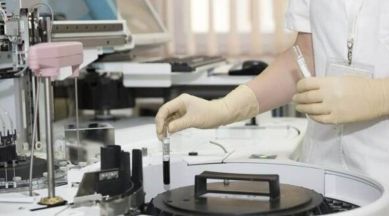Stay updated with the latest - Click here to follow us on Instagram
Scramble for genome-sequencing samples at labs in Maharashtra as pandemic curve flattens
Following a Central government directive to ramp up genome sequencing, the state has decided to collect random samples from hospitals and patients with respiratory infections.

SEVEN LABORATORIES are scrambling for samples for genome sequencing — to study changes or mutations in virus structures over time — amid flattening of the pandemic curve in the state. Due to fewer sample collections, the laboratories are sequencing samples from other states.
Following a Central government directive to ramp up genome sequencing, the state has decided to collect random samples from hospitals and patients with respiratory infections.
monthly limit of free stories.
with an Express account.
Although the state conducted nearly 40 per cent of the country’s genome sequencing, the drop in daily cases because of the flattening curve of the Covid-19 pandemic, the health officials are struggling to acquire enough samples for the testing.
Last month, the state failed to meet its target of 8,000 genome sequencing.
A scientist from CSIR-NEERI said that they can sequence 1,200 samples every month. But due to the unavailability of samples, they had to take samples from Tamil Nadu for sequencing. “We have to keep a tab on the emerging and mutating variants of SARS-Cov-2. But if there are no samples for analysis, we can’t do anything about it. Our responsibility is to do the testing, not the collection of samples,” said the scientist.
Several rural districts like Nandurbar, Hingoli, Beed among others with fewer active cases didn’t send any sample for genome sequencing. “In the third wave, we had a huge number of patients and their close contacts to collect samples. But now, the number of active patients is almost zero in my district,” said a health department official from Nandurbar.
Considering the growing cases of Covid-19 in European countries, the Centre on March 17 instructed the states ‘To focus on aggressive and sustained genome sequencing and intensified surveillance and keep an overall vigil on the Covid-19 situation.’
Following this, the state has decided to widen their sample collection criteria. All the districts have been instructed to collect random samples from hospitals and people with respiratory infections. “The decision to test patients with Severe Acute Respiratory Infection (SARI) and Influenza-like illness (ILI) will help in early diagnosis of the presence of any new variant,” said Dr Pradeep Awate, State Surveillance Officer.
The Brihanmumbai Municipal Corporation (BMC) has decided to run genome sequencing on wastewater if it turns positive in RT-PCR tests. “We will start collecting wastewater from different regions of the city. Once the samples are identified with SARS-Cov-2, we will run genome sequencing to know the variant,” said Suresh Kakani, Additional Commissioner, BMC.
On Saturday, the state had around 1,500 active Covid-19 cases.